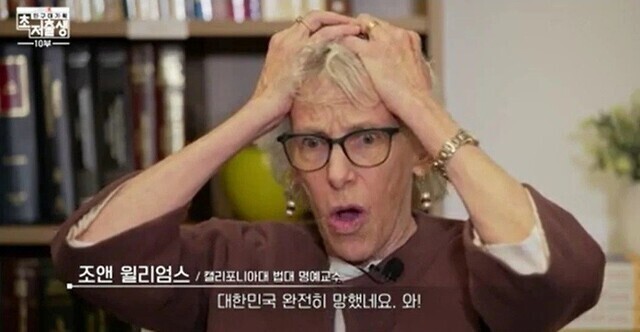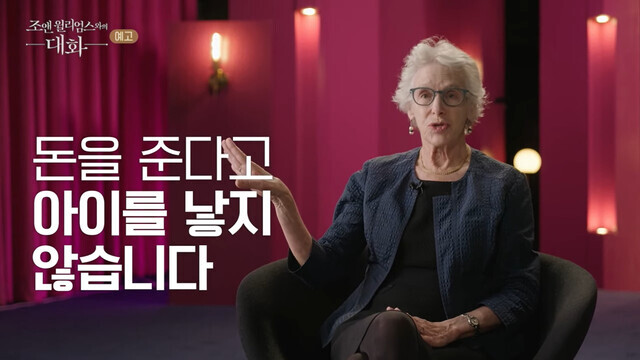hankyoreh
Links to other country sites 다른 나라 사이트 링크
‘That will not work’: Joan Williams says cash handouts won’t make Koreans have kids

“Give people money to have children? That will not work.”
Joan Williams, a professor emeritus at UC Law San Francisco, who warned South Korea of the dangers of its low birth rate by exclaiming “Korea is so screwed,” is once again giving the country invaluable advice.
A world-renowned expert in the field of labor, Williams went viral after a still of her clutching her head while saying “Korea is so screwed. Wow!” after being informed of South Korea’s total fertility rate of 0.78 in the Educational Broadcasting System (EBS) documentary “Population Planning in the Age of Ultra-low Birth,” blew up on social media.
In a preview of “A Conversation with Joan Williams: Korea is So Screwed, Wow!” an EBS anniversary special, uploaded to EBS’ YouTube channel on June 7, Williams opines that the work habits that created the Korean miracle are exactly what prompted the birth rate to fall. She made it clear that giving people money to have children “will not work.” This implies that cash incentives will not force the birth rate back up unless there is a total revamp of the work system that makes it impossible for people to be both workers and dedicated members of a family.
Williams stressed the importance of creating a different work system. In the preview, she says, “Being an ambitious worker and also having caregiving responsibilities is seen as close to impossible in South Korea.”
She astutely pointed out, “Exactly the same work habits that created the Korean miracle are now really undercutting society.”
Williams advised that the ideal worker does not work grueling hours, but maintains a good work-life balance. She stated that South Korea’s “ideal worker,” a figure who is told that they should be able to work at every beck and call, is part of a social system that was constructed in the 1950s, in which men were the breadwinners of the family and women were stay-at-home mothers, adding that it is a system detrimental to both men and women.

She points out that South Korea has become a society in which women work eight times more than men when it comes to household chores, and six times more than men when it comes to caregiving duties. On the other hand, men are climbing up the social ladder in their workplaces only to never discover the joys a parent can experience while looking after their children.
During a recent interview with JTBC, in which Williams was informed that since she declared that South Korea was “screwed,” the total birth rate of 0.78 has fallen yet again, she stated that the development was “deeply shocking.”
“I’ve never seen a fertility rate like that absent of a massive pandemic or a war,” she said. “The numbers say it’s a national emergency.”
According to a report on population trends for March published by Statistics Korea in May, the total fertility rate for the first quarter of 2024 was 0.76, 0.06 lower than the rate in the first quarter of 2023, which was 0.82. The total fertility rate is an estimate of how many children women capable of childbearing will have in their lifetimes. This was the first time that the rate has fallen to the 0.7 range in the first quarter of the year, which usually sees the highest rates of the year.
On the topic of raising a child, Williams told JTBC, “It was difficult for me, it was difficult for my daughter, and we weren’t working in this kind of extreme-hours work culture.”
“Korea’s an outlier in the causes that create the low birth rate,” she said.
“You have a work system that’s really designed around an ‘ideal worker’ who’s basically always available at work, and a family system that is designed around having an adult to care for the child, and those just don’t match,” she went on.
“A Conversation with Joan Williams” will be broadcast on EBS 1TV at 10:45 pm on June 20.
By Joh Yun-yeong, staff reporter
Please direct questions or comments to [english@hani.co.kr]

Editorial・opinion
![[Column] The tragedy of Korea’s perpetually self-sabotaging diplomacy with Japan [Column] The tragedy of Korea’s perpetually self-sabotaging diplomacy with Japan](https://flexible.img.hani.co.kr/flexible/normal/500/300/imgdb/original/2024/0617/4017186120752965.jpg) [Column] The tragedy of Korea’s perpetually self-sabotaging diplomacy with Japan
[Column] The tragedy of Korea’s perpetually self-sabotaging diplomacy with Japan![[Column] Moon Jae-in’s defense doublethink [Column] Moon Jae-in’s defense doublethink](https://flexible.img.hani.co.kr/flexible/normal/500/300/imgdb/original/2024/0617/9017186119477876.jpg) [Column] Moon Jae-in’s defense doublethink
[Column] Moon Jae-in’s defense doublethink- [Column] S. Korea-China cooperation still has a long way to go
- [Editorial] Seoul must use tact and diplomacy to check deepening Russia-NK ties
- [Editorial] Thorough audit, evaluation of oil test drilling are needed
- [Editorial] Yoon prioritizes his administration over South Korea’s safety once again
- [Column] The monumental shift in N. Korea’s nuclear program that never happened
- [Editorial] Yoon must submit himself to questioning over Marine investigation interference
- [Editorial] Court’s reversal of prosecutor’s impeachment will only embolden his peers
- [Column] How Korea’s restaurant servers went from being called ‘aunties’ to ‘bosses’
Most viewed articles
- 1As Putin heads to Pyongyang, differing interests may make for difficult deals
- 2US extended deterrence on Korea violates international law, argue experts
- 3Could Putin’s visit to North Korea resurrect a Cold War-era military alliance?
- 4[Column] Moon Jae-in’s defense doublethink
- 5[Reporter’s notebook] Better late than never to summon Korea's first lady for questioning
- 6[Column] The tragedy of Korea’s perpetually self-sabotaging diplomacy with Japan
- 7Will China use diplomatic, security dialogue with Seoul to check Russia’s cooperation with N. Korea?
- 8Korea to offer K-culture training visas, unlimited ride transit passes for tourists
- 9What’s up with N. Korea installing a wall along the border with the South?
- 10[Column] S. Korea-China cooperation still has a long way to go